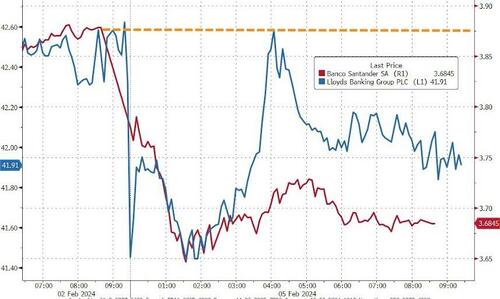Major European Banks At Center Of Complex Iran Sanctions Evasion Scandal
Ever since Obama’s very short-lived nuclear deal with Iran was scrapped by the subsequent Trump administration, Tehran has ramped up its efforts at sanctions evasion, which has especially relied on a fleet of ‘ghost tankers’ sailing primarily to China.
But the story of the secret cooperation of reputable European banks, and sophisticated efforts to hide large Iranian transactions has been a more interesting development, and this week Lloyds and Santander UK (based in Spain) have been in the spotlight, causing their shares to take significant hits on Monday. One Europe-based broker has observed, “The market must be realizing that they may be fined.”
A new Financial Times report has raised uncomfortable questions based on smoking gun internal documents which show two of Europe’s biggest banks covertly moving Iranian funds around the world on behalf of an Iranian petrochemicals company based in London.
What’s more is that the Iran’s state-controlled Petrochemical Commercial Company even has offices physically located close to Buckingham Palace. FT writes that the company is “part of a network that the US accuses of raising hundreds of millions of dollars for the Iranian Revolutionary Guards Quds Force and of working with Russian intelligence agencies to raise money for Iranian proxy militias.”
“Both PCC and its British subsidiary PCC UK have been under US sanctions since November 2018,” the report continues. “Documents, emails and accounting records show that during this time PCC’s UK division has continued to operate out of an office in Grosvenor Gardens in Belgravia by using a complex web of front entities in Britain and other countries.
While this has been going on for years, the scandal has likely only broken out into public reporting given the US and UK coalition are slipping into an active state of war with Iranian proxies from the Red Sea to Iran and Syria. The White House has also yet to rule out targeting Iranian territory directly. It’s easy to imagine that before the fast-moving events of the Gaza war and its broader regional spillover, Washington and its allies didn’t want to probe too deep amid efforts to maintain oil price stability in the wake of the Russia-Ukraine war.
But certainly in light of what FT has found, it will be harder to “look the other way” on Iranian malfeasance and enablers in major Western financial institutions:
Documents analyzed by the FT show that since being placed under US sanctions PCC has used companies in the UK to receive funds from Iranian front entities in China while concealing their real ownership through “trustee agreements” and nominee directors.
One of these companies, called Pisco UK, is registered to a detached house in Surrey and used a business account with Santander UK. According to the UK corporate registry, Pisco UK is fully owned by a British national called Abdollah-Siauash Fahimi.
Interestingly, the revelations are the apparent result of Iranian opposition activists, which dumped initial documents online. “However, internal documents, some of which have been leaked online by the Iranian opposition website WikiIran, show that Pisco is fully controlled by PCC and that Fahimi signed an agreement to own the company in trust on its behalf,” details the FT report.
Iran used UK banks Lloyds and Santander accounts to evade sanctions: FT
Oh, and Iran didn’t use bitcoin, FYI @SenWarren https://t.co/tiz2yKaCue pic.twitter.com/7AOMjl2OgQ
— zerohedge (@zerohedge) February 4, 2024
Entirely to be expected, China too is involved, but all of these intermediaries are claiming to still be in full compliance with the US-led sanctions regimen:
In 2021 Pisco’s Santander account received a transfer from a Chinese company called Black Tulip, which internal PCC records show is another trustee company controlled by a PCC employee. The US Treasury last year accused Iranian petrochemicals companies of using multiple front entities to evade sanctions by routing sales through Asia. Santander said it was unable to comment on specific client relationships but was “highly focused on sanctions compliance”.
Some of the internal communications brought to light show that the parties involved are fully aware of the sanctions-skirting activity:
Emails show that in July 2021 a PCC accounting official in Tehran emailed Rejal about a planned payment from China, telling him, “Please send us the safe account No. For payment.” Rejal instructed the accounting official to transfer the money into Aria Associates’ Lloyds account, writing: “Please make sure that there should not be any indication of PCC or PCC (UK).”
The FT report contains plenty of ‘smoking guns’ suggesting something akin to Iranian oil/money laundering on a large scale through Western institutions, though Tehran certainly sees it as its “right” to do legitimate business amid the ‘illegal’ Washington sanctions regimen.
Of course, those behind the report, especially the Iranian opposition activists, hope this will receive a response out of a reluctant Biden administration – reluctant given Biden is soon headed into what promises to be a tight election and needs low-priced, stabilized oil, which is also why he’s seeking to bring even Maduro’s Venezuela “in from the cold” – which as it turns out isn’t going too well.
Meanwhile, this raises some other questions concerning misplaced priorities among Western and US politicians especially…
Oh shut up https://t.co/b7cggVqf0q pic.twitter.com/yETRcVuYtR
— zerohedge (@zerohedge) January 11, 2024
Tyler Durden
Tue, 02/06/2024 – 04:15 Source
 RSS Feed
RSS Feed















 February 6th, 2024
February 6th, 2024  Awake Goy
Awake Goy 

 Posted in
Posted in  Tags:
Tags: 













